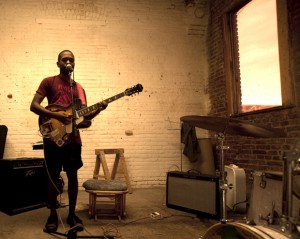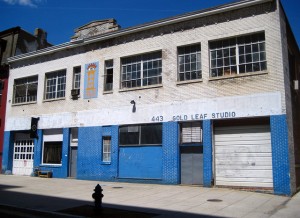Is D.C. Too Expensive To Be Creative? Fugazi’s Ian MacKaye Weighs In
At the end of the month, one of D.C.’s last large DIY spaces will close, putting out dozens of artists. It will be replaced by a $57 million development. Washington City Paper has this excellent write-up chronicling the history of Gold Leaf Studios and the artists it hosted:
For well over a decade, Gold Leaf’s 12 studios have housed legion creative types like [Durkl creative director Will] Sharp. And while Gold Leaf attracted packed crowds and scattered media attention over the years as its art parties grew notorious, its more important legacy is simply as a cheap, spacious place for folks to do their work. “There are happy artists here over 50 that come in at night and paint,” says Sharp. “Artists, welders, sculptors, musicians, and jewelers all under one roof is kind of an oasis for someone like me.”

Courtesy of Bora Chung
Brandon Moses of Laughing Man practices in his Gold Leaf studio.
Although Gold Leaf Studios was never intended to be permanent, its sale and closure come at a time when D.C.’s housing prices are rising. There’s been a recent, ongoing discussion over whether D.C. has become too expensive for artists to create and live. (Noticeably absent from the discussion is how go-go, a D.C. music genre, is increasingly being relegated to cheaper suburbs).
Slate’s Matthew Yglesias writes, “I don’t think it’s a coincidence that the city was probably more culturally influential during its mid-eighties quality of life nadir than it is today as a richer-but-prohibitively expensive city.” That’s when D.C. gave birth to groups like post-punk band Fugazi.
Fugazi founding member Ian MacKaye stopped by WAMU 88.5′s offices last week to discuss an online archiving project on The Kojo Nnamdi Show. We caught up with him afterward to get his thoughts on D.C., art and gentrification.
Although it’s very challenging to make a living off of one’s art in D.C., that doesn’t stop creativity, which comes from people of all social strata. MacKaye recalled how the drummer for Henry Rollins’ band State of Alert had a naval admiral for a father.
“Punk kids would walk onto the observatory to practice at the admiral’s house,” MacKaye recalled. “Those guys, you’d think of them as having means. But it didn’t change the fact that as kids they were bored and creative and they wanted something to be a part of.”
“The punk thing, the emphasis was on creating a set, a tribe,” he continued. “There’s art movements that have come up and it’s the art of necessity. If you want to belong to something, you better go find somebody similar to get connected to.”
Can D.C. give rise to such a movement again? MacKaye believes that D.C. has “incredible potential” for it, despite it being an expensive town.
“I think this city is really ripe for this sort of thing, because of the compression of the city but also because so many people come here, people who are interested, they come here and they want something so badly,” he said.
That’s encouraging to the musicians of Gold Leaf. Now, they just have a new place to practice.
-
oboe







